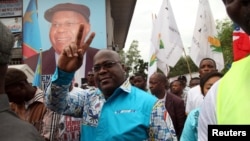A Congolese opposition leader is calling for widespread civil disobedience beginning on October 1 to protest the absence of elections. The protest across the Democratic Republic of the Congo would include refusing to pay taxes or pay for public services.
Felix Tshisekedi, the son of deceased opposition leader Etienne Tshisekedi and president of the opposition alliance known as the Rassemblement de l’opposition Congolaise (Rassop), told VOA’s French to Africa Service that the campaign is aimed at showing President Joseph Kabila that he no longer has credibility in the eyes of the public.
“From October 1 onward, we will launch the disobedience and, for us, Joseph Kabila will no longer be anything,” he told VOA. “He will be a simple citizen who can no longer represent or speak in the name of the DRC. That must be clear.”
Kabila has been in power for 16 years, and, although his term officially ended last December, he continues to hold power and has set no timetable for elections.
An agreement negotiated last year with the help of the National Episcopal Conference of the Congo stated that Kabila must organize elections and abandon any plans to modify the Constitution. However, the DRC’s national elections commissioner has said elections this year are not possible due to the ongoing conflict in the Kasai region and the need for a national registry of eligible voters.
Opponents have called this a stalling tactic and said the DRC could logistically hold elections this year with the help of the United Nations and other international partners.
“I strongly believe elections can happen. If it doesn’t happen, it’s because Kabila doesn’t want them to happen,” Tshisekedi said.
Demonstration or destabilization?
Some have worried that the opposition’s call for disobedience and withholding taxes could further destabilize the country. Tshisekedi denies it will make matters worse.
“The country is already dying. These taxes are stolen or misspent,” Tshisekedi said. “They don’t go toward the well-being of the state. And when the funds aren’t stolen, they’re used to buy arms to kill the people.”
The regional economic bloc, the Southern African Development Commission (SADC), plans to send an emissary to the Congo in the hopes of kickstarting further negotiations.
The SADC has agreed with the elections commissioner that polls in 2017 are impossible. Instead, they asked the DRC’s Independent National Electoral Commission to publish a revised electoral calendar and set dates for the elections.
Former South African president Thabo Mbeki was among those urging the SADC to help broker a solution to the conflict, warning that “more people may very well die if the matter is not resolved.”
Tshisekedi said his party has no interest in negotiating with Kabila or his government.
“You cannot go to the person who was the arsonist when he acts like he wants to play the firefighter,” Tshisekedi told VOA. “... He is no longer a reliable negotiating partner.”





